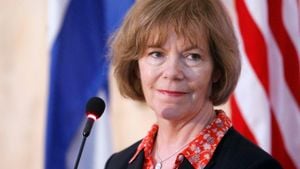US-Poland relations are on the upswing as both nations solidify their alliance against the backdrop of the enduring conflict in Ukraine. Recent meetings between Polish officials and US leadership have underscored this commitment, with discussions focusing on military presence, security, and economic ties.
On February 22, 2025, Polish Foreign Minister Radosław Sikorski met with US Secretary of State Marco Rubio for their first official engagement, which followed a preliminary phone call on January 23. The war in Ukraine dominated the agenda, with Sikorski affirming, "Europe will keep supporting the fighting Ukraine as long as Ukraine needs it," reflecting the strong commitment of European nations to assist their neighbor during its time of crisis.
The discussions also delved deep by addressing the issue of using frozen Russian assets to bolster Ukraine’s defense and the imposition of effective sanctions against Russia. Sikorski’s position highlights the importance of maintaining pressure on Moscow, aligning closely with the shared interests of the Western alliance. This meeting was significant, as he became the first European foreign minister outside of the Quint—comprising the US, UK, Germany, France, and Italy—to engage directly with Secretary Rubio.
Later, at the Conservative Political Action Conference (CPAC), President Andrzej Duda of Poland met with former President Donald Trump. Their discussions revolved around Poland's security amid the precarious situation brought about by Russia’s invasion of Ukraine. Following their meeting, the Polish President’s Office announced on X, stating, "President Trump confirmed he envisions strengthening the American presence in Poland rather than reducing it." This reinforcement of the US presence aligns with Duda's request for boosting military support, emphasizing Poland's growing role as a credible ally within the alliance.
During his conversations, Duda also expressed his belief to Ukrainian President Volodymyr Zelensky about the necessity of US involvement. "There is no other way to stop the bloodshed and achieve lasting peace...except with the support of the United States," he remarked, highlighting Poland’s strategic interest not only for its own national security but for the broader stability of the region.
Duda painted Trump as someone with "a deep sense of responsibility for global stability and peace," indicating the Polish administration's hope for constructive cooperation with the current US leadership. This perspective resonates with the overall goal to maintain stability amid the uncertain geopolitical climate following Russia's actions.
The discussions at CPAC came shortly after Sikorski's meeting with Rubio, illustrating how both high-level engagements are synchronized to forward common interests amid the conflict. On the eve of the third anniversary of Russia's full-scale invasion of Ukraine, Poland's National Security Council is slated to meet for key discussions, underscoring the potential ramifications of these strategic dialogues.
Both leaders' meetings signify not just political posturing, but also stem from genuine concerns over security dynamics. For Poland, the presence of the US military is not just about deterrence, but also about partnering on broader strategic initiatives, including trade and energy dependencies.
It is increasingly evident from these engagements how Poland, facing the existential threat from its eastern neighbor, views the US as both protector and partner. Sikorski’s emphasis on building lasting peace and Duda’s insistence on bolstered military support delineate the increasingly pivotal role Poland seeks to play as a broker for peace and stability within the region.
With the lens increasingly focused on military presence and bilateral cooperation, the strengthening of US-Poland relations echoes throughout Central Europe, presenting not only military dynamics but also substantial economic cooperation potential. Through top-level dialogues, both countries are taking strides toward fortifying their partnership, ensuring mutual interests are upheld as both nations navigate the complex realities born from the war.
This collaborative approach marks another step toward integrated security strategies across Europe, which are becoming more urgent each day as the stakes of the conflict remain high. Poland's allegiances and the comprehensive dialogue at leadership levels serve as foundational elements for future cooperative efforts between the US and Poland, embodying resilience against regional threats posed by Russia.
The recent meetings reflect the urgency necessary to contend with the multifaceted challenges of international relations today, especially as both leaders openly reiterate their commitment to ensuring peace, stability, and mutual support going forward.



